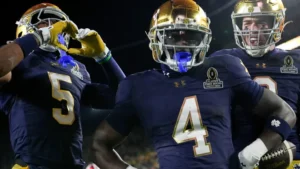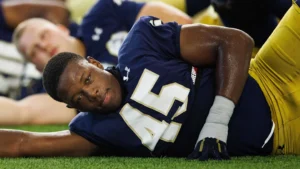
Rudy Ruettiger’s story is one of the most inspirational tales in the history of college football. His journey from being an undersized, overlooked, and underestimated player to earning a spot on the University of Notre Dame football team is a testament to perseverance, dedication, and the belief that anything is possible if you don’t give up. His life became even more legendary with the release of the 1993 film Rudy, which immortalized his struggles, triumphs, and eventual moment of glory when he sacked the quarterback in his one and only appearance on the field for the Fighting Irish.
However, as much as Rudy’s story is one of triumph, it also carries a deep sense of authenticity and connection to the roots of college football—a sport deeply tied to the values of hard work, humility, and team spirit. Over the years, Rudy Ruettiger has become increasingly vocal about his disillusionment with the direction that college football has taken. Once a symbol of hope for many young players, college football has evolved into a complex, high-stakes business, and Rudy has expressed a deep concern that it has lost the essence of what made it special in the first place.
In this essay, we’ll explore the factors that have led to Rudy Ruettiger’s disappointment, including the commercialization of college football, the changing dynamics of player compensation, the decline of the student-athlete ideal, and the evolving structure of college football itself.
The Rise of Commercialization in College Football
When Rudy Ruettiger played at Notre Dame in the early 1970s, college football was far more humble. Games were broadcast on national television, but the sport had not yet become the behemoth that it is today. Major television deals, advertising partnerships, and enormous revenues were not the driving force behind college football. It was a sport built on tradition, passion, and a sense of community. Fans came to stadiums to cheer for their alma maters, not for massive endorsement deals or corporate sponsorships.
However, over the past few decades, college football has become increasingly commercialized. The sport has grown into a multi-billion-dollar industry, with networks vying for broadcast rights, athletic programs and conferences negotiating lucrative television deals, and stadiums named after corporations. As college football has become a financial juggernaut, the athletes—the very individuals who generate these profits—have often been left out of the equation. The focus has shifted away from the student-athlete experience to one that is driven largely by commercial interests.
For Rudy, this shift is troubling. The passion, grit, and community spirit that defined college football in its early years have been overshadowed by corporate interests. Rudy often speaks about the days when players truly played for the love of the game and the honor of representing their schools. Now, with millions of dollars at stake, many athletes are seen as commodities, with their value determined by their athletic prowess rather than their character or the school they represent.
This commercialization has changed the way the game is played and perceived. Programs with the most money—often the most successful programs—attract the best players, leaving smaller schools with fewer resources to compete. The competitive balance that once existed in college football has been diminished, and the charm of the underdog story, like Rudy’s own, seems to be a thing of the past.
The Changing Dynamics of Player Compensation
One of the most significant changes in recent years has been the shift in how college athletes are compensated. The issue of paying college athletes has been a longstanding debate, but it has gained significant traction in recent years. The NCAA has been under fire for its policies surrounding amateurism, which prohibit athletes from receiving financial compensation beyond their scholarships and other forms of aid.
While scholarships cover tuition, room, and board, they often don’t account for the costs of living, personal expenses, or the grueling hours that athletes put in to maintain their training and compete at the highest level. Players in the most high-profile sports, particularly football and basketball, generate enormous amounts of revenue for their schools and conferences, but they don’t see a dime of that revenue. In fact, many athletes face financial hardships while balancing their academic and athletic responsibilities.
The introduction of the Name, Image, and Likeness (NIL) policy in 2021 was a step forward in allowing athletes to earn money through endorsements and sponsorships, but Rudy believes it still doesn’t go far enough. The system continues to be inequitable, with players at elite programs receiving more opportunities and compensation than those at smaller schools. The NIL system, while a positive development, has also sparked concerns about the increasing commercialization of college sports, with players more focused on making money than on the intrinsic value of playing the game.
Rudy, who played at a time when players weren’t compensated financially, has spoken about how the purity of college football has been compromised by the influx of money. While he acknowledges that college athletes should be compensated for their work, he worries that the focus on financial gain has overshadowed the true spirit of the sport. College football, for him, was always about playing for pride, not for paychecks or endorsements.
The Decline of the Student-Athlete Ideal
When Rudy Ruettiger played for Notre Dame, the ideal of the “student-athlete” was still very much alive. Players were expected to balance their athletic commitments with their academic responsibilities, and the emphasis was placed on the importance of education. The University of Notre Dame, known for its academic rigor, was particularly steadfast in promoting the idea that student-athletes should be just that—students first, athletes second.
However, the growing commercialization of college football has led to a shift in this dynamic. In today’s world of big-time college football, many athletes prioritize their athletic careers over their academics. Some programs, especially in the Power Five conferences, operate like professional teams, with athletes spending most of their time in training, film study, and team activities. For many players, the academic side of college life has taken a backseat.
Rudy has expressed concern that this shift undermines the very purpose of higher education. College is supposed to be a place where young people can grow intellectually, socially, and personally—not just athletically. The modern college football system, according to Rudy, treats players more like employees than students. He laments the fact that many athletes, particularly those at the top programs, do not get the full college experience, as they are often isolated from campus life, focusing solely on football and their future professional careers.
While Rudy acknowledges that some players do succeed in both academics and athletics, he believes the emphasis on professional development in college football is detrimental to the overall college experience. He worries that the growing focus on athletes as commodities is eroding the idea that college is a time for personal development, not just athletic achievement.
The Evolution of the College Football Playoff and Conference Realignment
In addition to the commercialization of college football and the changing dynamics of player compensation, Rudy has also expressed frustration with the evolution of the sport itself. In particular, he has criticized the College Football Playoff (CFP) system and the ongoing wave of conference realignment that has reshaped the landscape of college football.
The CFP, which replaced the Bowl Championship Series (BCS) in 2014, was designed to determine a true national champion through a four-team playoff system. While the CFP has brought excitement and drama to the postseason, Rudy feels it has further solidified the dominance of the top programs, often at the expense of smaller schools and programs that may not have the financial resources to compete at the highest level. The playoff system, which gives preferential treatment to the power conferences, has diminished the chances of a Cinderella story—one that Rudy’s own journey embodies.
Conference realignment has also contributed to the commercialization of the sport. Over the past two decades, numerous programs have switched conferences in search of more lucrative television contracts and greater national exposure. This has created a situation where traditional rivalries and regional matchups are increasingly being replaced by financially motivated moves. For Rudy, college football’s roots in regional pride and tradition have been displaced by a focus on maximizing revenue.
Rudy has expressed a deep sense of nostalgia for the days when college football was about more than just money. He remembers a time when rivalries were personal, when fans filled stadiums not because of television contracts, but because of the shared history and passion for their schools. Today, he believes that many of these traditions have been lost in the chase for profits.
A Call to Return to the Roots of College Football
Rudy Ruettiger’s disappointment with the direction of college football stems from a deep sense of love for the game and its traditions. While he understands that the sport has evolved and that certain changes may be necessary, he believes that college football has lost sight of the values that made it great in the first place.
The commercialization of the sport, the changing nature of player compensation, the decline of the student-athlete ideal, and the evolution of the College Football Playoff and conference realignment are all factors that have contributed to his frustration. Rudy’s vision for the future of college football is one where the players, the schools, and the fans return to the core principles of the sport: hard work, dedication, pride, and a commitment to the community.
In many ways, Rudy Ruettiger’s story is a reminder that college football is not just about winning games or making money—it’s about representing something greater than oneself. It’s about playing for pride, tradition, and the love of the game. As the sport continues to evolve, it is important to remember the roots that made college football so special in the first place.
Perhaps, in the end, that’s the greatest lesson of all—no matter how much the game changes, the heart of college football will always lie in the spirit of the players and the communities that support them.





